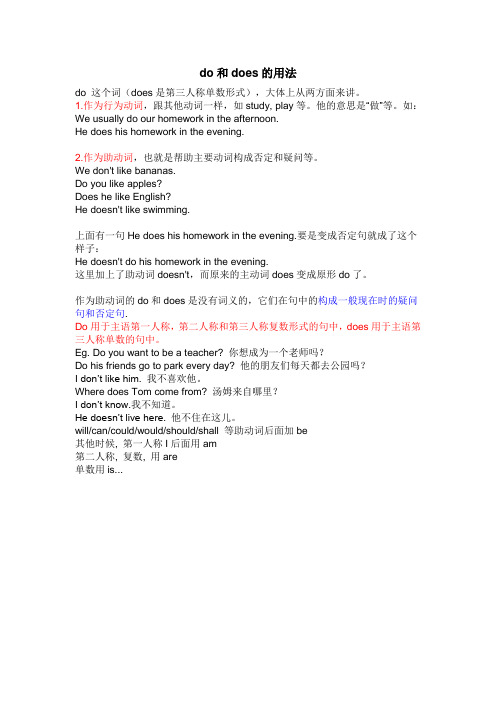do和does的用法
does do 区别和用法

does do 区别和用法摘要:1.DO的用法2.DO的区别3.DO的应用场景4.总结正文:在日常英语交流中,does和do常常被混淆,它们在用法上存在一定的区别。
本文将详细解释does和do的区别以及它们的用法,帮助你更好地掌握英语语法。
一、DO的用法Do主要用作动词,表示“做”这个动作。
它可以用作各种时态,如一般现在时、一般过去时和一般将来时。
例如:- I do exercise every day.(我每天锻炼。
)- He did his homework yesterday.(他昨天完成了作业。
)- They will do the laundry tomorrow.(他们明天会洗衣服。
)二、DO的区别1.助动词用法Does(第三人称单数)和do(第一人称、第二人称和复数)在疑问句和否定句中作为助动词使用。
例如:- Does he eat breakfast?(他吃早餐吗?)- She doesn"t do exercise.(她不锻炼。
)2.替代动词Does可以用作替代动词,表示某个动作的发生。
例如:- She doesn"t smoke, does she?(她不抽烟,对吗?)三、DO的应用场景1.一般疑问句:Does用于询问某人是否做过某事,或者询问某事是否发生。
- Does she like coffee?(她喜欢喝咖啡吗?)2.否定回答:Do的否定回答要用no,does的否定回答要用don"t。
- Do you speak French? - No, I don"t.(你会说法语吗?- 不,我不会。
)3.肯定回答:Do的肯定回答要用yes,does的肯定回答要用does。
- Does she play the piano? - Yes, she does.(她会弹钢琴吗?- 是的,她会。
)四、总结does和do在英语中都有“做”的意思,但它们在用法上存在一定的区别。
do和does的用法

do和does的用法do这个词(does是第三人称单数形式),大体上从两方面来讲。
1.作为行为动词,跟其他动词一样,如study, play等。
他的意思是“做”等。
如:We usually do our homework in the afternoon.He does his homework in the evening.2.作为助动词,也就是帮助主要动词构成否定和疑问等。
We don't like bananas. Do you like apples?Does he like English? He doesn't like swimming.上面有一句He does his homework in the evening.变成否定句是:He doesn't do his homework in the evening.这里加上了助动词doesn't,而原来的主动词does变成原形do了。
作为助动词的do和does是没有词义的,它们在句中的构成一般现在时的疑问句和否定句.Do用于主语第一人称,第二人称和第三人称复数形式的句中,does用于主语第三人称单数的句中。
Do you want to be a teacher?你想成为一个老师吗?I don’t like him. 我不喜欢他。
Where does Tom come from?汤姆来自哪里?I don’t know.我不知道。
He doesn’t live here. 他不住在这儿。
will/can/could/would/should/shall等助动词后面加be其他时候,第一人称I后面用am,第二人称,复数,用are单数用is...1/ 1。
do和does的区别用法

"Do" 和"Does" 是动词"do" 的不同形式,它们在英语中的用法有所区别。
1. "Do" 是用于一般现在时(Simple Present Tense)和一般过去时(Simple Past Tense)的第一人称(I,We),第二人称(You),和第三人称复数(They)的形式。
例如:- I do my homework every day.(我每天都做作业。
)- You did a great job.(你做得很好。
)- They always do their best.(他们总是尽力而为。
)2. "Does" 是用于一般现在时(Simple Present Tense)的第三人称单数(He,She,It)的形式。
例如:- He does his laundry on Sundays.(他每周日都洗衣服。
)- She does her homework after school.(她放学后做作业。
)- It does not rain very often in this area.(这个地区不经常下雨。
)注意事项:- 在疑问句中,使用"Do" 和"Does" 来询问问题。
例如:- Do you like ice cream?(你喜欢冰淇淋吗?)- Does he speak Spanish?(他会说西班牙语吗?)- 在否定句中,使用"Do not" 和"Does not" 或其缩写形式"Don't" 和"Doesn't" 来表示否定。
例如:- I do not want to go to the party.(我不想去参加派对。
)- She doesn't like spicy food.(她不喜欢辣食。
do--does的用法

*助动词的用法,帮助实义动词构成否定句和疑问句。
do 这个词(does是第三人称单数形式),大体上从两方面来讲。
1.作为行为动词,跟其他动词一样,如study, play等。
他的意思是“做”等。
如:We usually do our homework in the afternoon.He does his homework in the evening.2.作为助动词,也就是帮助主要动词构成否定和疑问等。
●do用于当主语是第一人称I, 第二人称you 及复数时(复数包括we, they, these, those及两个以上的人或者事物)。
●does 用于当主语是第三人称单数时(第三人称包括she, he, it, this, that,单独的事物或者人名等)。
*含有实义动词的句型结构变换一、肯定陈述句1.当主语是I,you及复数时,谓语动词用原型。
Eg. I know it.They have two volleyballs.Tina and Tom like ice cream.2. 当主语是第三人称单数时(第三人称包括she, he, it, this, that,单独的事物或者人名等)。
谓语动词要变为第三人称单数形式。
特别要注意have—has Eg. She has a set of keys.He knows my name.Tom needs a computer game.二、肯定陈述句变换成否定陈述句1.当主语是I,you及复数时,在谓语动词前加do not = don’tEg. I don’t know it.They don’t have two volleyballs.Tina and Tom don’t like ice cream.2. 当主语是第三人称单数时,在谓语动词前加does not = doesn’t, 谓语动词打回原型Eg. She doesn’t have a set of keys.He doesn’t know my name.Tom doesn’t need a computer game.三、肯定陈述句变换成一般疑问句采用“一加二变三问号”。
do和does的用法

do和does的用法do 这个词(does是第三人称单数形式),大体上从两方面来讲。
1.作为行为动词,跟其他动词一样,如study, play等。
他的意思是“做”等。
如:We usually do our homework in the afternoon.He does his homework in the evening.2.作为助动词,也就是帮助主要动词构成否定和疑问等。
We don't like bananas.Do you like apples?Does he like English?He doesn't like swimming.上面有一句He does his homework in the evening.要是变成否定句就成了这个样子:He doesn't do his homework in the evening.这里加上了助动词doesn't,而原来的主动词does变成原形do了。
作为助动词的do和does是没有词义的,它们在句中的构成一般现在时的疑问句和否定句.Do用于主语第一人称,第二人称和第三人称复数形式的句中,does用于主语第三人称单数的句中。
Eg. Do you want to be a teacher? 你想成为一个老师吗?Do his friends go to park every day? 他的朋友们每天都去公园吗?I don’t like him. 我不喜欢他。
Where does Tom come from? 汤姆来自哪里?I do n’t know.我不知道。
He doesn’t live here. 他不住在这儿。
will/can/could/would/should/shall 等助动词后面加be其他时候, 第一人称I后面用am第二人称, 复数, 用are单数用is...1、名词A)、名词的数我们知道名词可以分为可数名词和不可数名词,而不可数名词它没有复数形式,但可数名词却有单数和复数之分,复数的构成如下:一)在后面加s。
do和does的用法

• 上面有一句He does his homework in the evening. 要是变成否定句就成了这个样子: • He doesn't do his homework in the evening. 这里加上了助动词doesn't,而原来的主动词 es是第三人称单数形式),大体 上从两方面来讲。 • 1.作为行为动词,跟其他动词一样,如study, play等。他的意思是“做”等。如:
• We usually do our homework in the afternoon.
• He does his homework in the evening.
• 2.作为助动词,也就是帮助主要动词构成否定和 疑问等。作为助动词的do和does是没有词义的, 它们在句中的构成一般现在时的疑问句和否定 句.Do用于主语第一人称,第二人称和第三人称 复数形式的句中,does用于主语第三人称单数 的句中。 • We don't like bananas. (do not=don’t) • Do you like apples? • Does he like English? • He doesn't like swimming.
助动词do和does的用法顺口溜

助动词do和does的用法顺口溜1. Do和does是帮助动词,也叫虚拟助动词,常用于句子中的疑问句或否定句中,用来改变句子的语序。
2. 在一般现在时中,用do和does来构成一般疑问句,do用于第一人称,does用于第三人称,其后接动词原形,如:Do you like music? Does he like music?3. 在一般现在时中,用do和does来构成否定句,do用于第一人称,does用于第三人称,其后接动词原形,如:I do not like music. He does not like music.4. 在一般过去时中,用did来构成疑问句和否定句,无论是第一人称还是第三人称,其后接动词原形,如:Did you like music? Hedidn't like music.5. 在现在完成时中,用have/has done来构成疑问句和否定句,have/has done用于第一人称和第三人称,其后接动词过去分词,如:Have you done your homework? He hasn't done his homework.6. 在现在完成时中,表示连续性的动作,用have/has been doing来构成疑问句和否定句,have/has been doing用于第一人称和第三人称,其后接动词-ing形式,如:Have you been studying for the exam? He hasn't been studying for the exam.7. 在将来时中,用will/shall do来构成疑问句和否定句,will/shall用于第一人称和第三人称,其后接动词原形,如:Will yougo to the party? He won't go to the party.8. 表示某人正在或将要做某事时,用be going to do来构成疑问句和否定句,be going to用于第一人称和第三人称,其后接动词原形,如:Are you going to do your homework? He isn't going to do his homework.。
do和does的用法

do和does的用法do 这个词(does是第三人称单数形式),大体上从两方面来讲。
1.作为行为动词,跟其他动词一样,如study, play等。
他的意思是“做”等。
如:We usually do our homework in the afternoon.He does his homework in the evening.2.作为助动词,也就是帮助主要动词构成否定和疑问等。
We don't like bananas.Do you like apples?Does he like English?He doesn't like swimming.上面有一句He does his homework in the evening.要是变成否定句就成了这个样子:He doesn't do his homework in the evening.这里加上了助动词doesn't,而原来的主动词does变成原形do了。
作为助动词的do和does是没有词义的,它们在句中的构成一般现在时的疑问句和否定句.Do用于主语第一人称,第二人称和第三人称复数形式的句中,does用于主语第三人称单数的句中。
Eg. Do you want to be a teacher? 你想成为一个老师吗?Do his friends go to park every day? 他的朋友们每天都去公园吗?I don’t like him. 我不喜欢他。
Where does Tom come from? 汤姆来自哪里?I don’t know.我不知道。
He doesn’t live here. 他不住在这儿。
will/can/could/would/should/shall 等助动词后面加be其他时候, 第一人称I后面用am第二人称, 复数, 用are单数用is...。
- 1、下载文档前请自行甄别文档内容的完整性,平台不提供额外的编辑、内容补充、找答案等附加服务。
- 2、"仅部分预览"的文档,不可在线预览部分如存在完整性等问题,可反馈申请退款(可完整预览的文档不适用该条件!)。
- 3、如文档侵犯您的权益,请联系客服反馈,我们会尽快为您处理(人工客服工作时间:9:00-18:30)。
?二 Does的用法(用于对she,he,it的提问,我们主要了解 对she和he的提问):
ቤተ መጻሕፍቲ ባይዱ
?一.选词填空。 ?1. [Do/Does]_________ he watch TV at night? Yes he does. ?2. [Do/Does]_________ you go to school every每da天y()? No, I
don't. ?5. [Do/Does]_________they play football? Yes, they
do和does引导的疑问句叫 作一般疑问句
do用于一二人称,does用 于第三人称。本节课我们 将了解简单的do/does问 句。
?一 Do的用法: ?(用于对I ,you,we,they的提问,我们主要学习对you和
they的提问)。 ?肯定回答用“Yes,I/we/they do ” ?否定回答用“No,I/we/they don't”.
_______[do/does]. ?7. [Do/Does]_______ they like apples ? No, they _____[do
not/does not]. ?9. [Do/Does]________ I have a big nose? No, you _______[do
not/does not].
? 二 翻译句子: ? 1 ——你喜欢桃子吗? ——是的,我喜欢。 ? __________________________________________________________ ? 2——他喜欢狗吗? ——不,他不喜欢。 ? __________________________________________________________ ? 3——你有铅笔吗? ——不,没有。 ? ___________________________________________________________
?肯定回答用“Yes,( she/he )does” ?否定回答用“No, ( she/he)doesn't.
? (1)Does she like oranges ? Yes,she does. ? No,she doesn't. ? (2)Does he have ruler ? ? Yes,he does. ? No,he doesn't.
